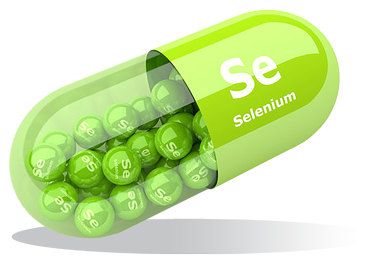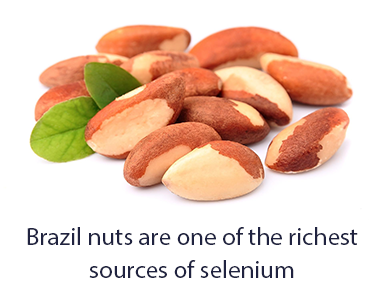Selenium – essential element

Selenium is a chemical element with the symbol Se and atomic number 34. It is a metalloid (more rarely considered a Non Metal) with properties that are intermediate between the elements above and below in the periodic table, sulfur and tellurium, and also has similarities to arsenic. It seldom occurs in its elemental state or as pure ore compounds in Earth's crust. Selenium (from Ancient Greek σελήνη (selḗnē) 'moon') was discovered in 1817 by Jöns Jacob Berzelius, who noted the similarity of the new element to the previously discovered tellurium (named for the Earth).
Selenium is a trace element. It occurs in the earth's crust at 0.05 ppm as an impurity in some sulfide ores. Selenium is one of the essential micronutrients and must be supplied in the diet. The content of selenium in food products varies greatly, which is associated with large differences in the selenium content of soil and water in different parts of the world. Soils in Poland are considered poor in selenium. Therefore, there is little selenium in water and plants, and consequently also little in the food consumed.
Selenium sources in food
The amount of selenium in food depends on on the selenium content in the environment (water, soil, plants) from which the food comes. The distribution of selenium (Se) in the earth's crust is uneven. Soils of some areas of Russia, USA, Venezuela contain very large amounts. Soils of New Zealand, some areas of China, West Korea, Siberia and Europe have very low concentrations. Selenium deficiency occurs in regions with sparse presence of rock materials. These include the northeastern soils of the USA, northern Germany, Denmark, Poland and the Baltic states, central Russia from the Urals to all of Siberia, inclusive. Se concentrations in volcanic rocks are estimated at 120 µg/g, soils contain 0.005-1200 µg/g, most often within the range of 0.1-10 µg. In regions poor in selenium, its concentration is at the level of 0.005–2.0 µg. Plants, drawing selenium from the soil, provide it to all organisms. For these environments, selenium is an important trace element, indispensable for proper functioning, it can also be a factor whose excess or deficiency causes undesirable effects. (Source: Advanced soil geochemical atlas of England and Wales Selenium in England and Wales UK Soil Observatory

Food sources of selenium: cereals, meat, eggs, dairy products, fish and shellfish. Not all foods are a good source of selenium, because this element is not well absorbed in the digestive tract in every form. The basic role in bioavailability is played by the chemical form of selenium. Selenium obtained from yeast is characterized by the highest bioavailability. In addition, the absorption of selenium is supported by some proteins, amino acids and vitamins (mainly A, E, C). The synergistic effect of selenium with vitamin E contributes to delaying the aging process and accelerating cell regeneration.
Selenium content in selected foods
| Type of Food | Selenium Content in 100 Grams |
|---|---|
| Brazil nuts | |
| Beef liver | |
| Yellowfin tuna | |
| Halibut | |
| Chia seeds* | |
| Herring | |
| Sunflower seeds | |
| Chicken brest | |
| Turkey | |
| Salmon | |
| Chicken egg, large approx. 65g | |
| Brown rice | |
| Mushrooms |
How much selenium do we need?
As with any element and vitamin, the amount of selenium we need depends on the following factors: (1) age, (2) physiological state, (3) health, i.e. diseases, etc., (4) diet (people following a meat-free diet are at higher risk of selenium deficiency). (5) where you live (some regions are more prone to selenium deficiency than others).
It is estimated that the UK lies in areas poor in selenium, which is why selenium deficiencies in the diet of English people are often observed. Therefore, selenium supplementation may be important in the English people diet, especially in the case of people with dietary restrictions (e.g. vegans and vegetarians), people suffering from chronic diseases of the digestive tract (such as Crohn's disease or ulcerative colitis) accompanied by impaired absorption and elderly people, as selenium absorption deteriorates with age. Smokers, alcohol drinkers and contraceptives may also be at risk of selenium deficiency.
The selenium requirement depending on age
| Age | Daily selenium requirement in µg |
|---|---|
| Infants up to 6 months of age | |
| Infants and and small children up to 9 years of age | |
| Children aged 10-12 | |
| Children over 13 years of age | |
| Adult women | |
| Adult men | |
| Pregnant and lactating women |
*Salvia hispanica, one of several related species commonly known as chia, is a species of flowering plant in the mint family, Lamiaceae, native to central and southern Mexico and Guatemala. It is considered a pseudocereal, cultivated for its edible, hydrophilic chia seed, grown and commonly used as food in several countries of western South America, western Mexico, and the southwestern United States.
Moreover chia seeds contain valuable minerals for human health: iron, magnesium, zinc, phosphorus, as well as calcium and vitamins: E, B1, B3. Chia seed oil contains a very high concentration of omega-3 fatty acids - about 64%, as well as omega-6 fatty acids, which are in a beneficial for health and disease prevention ratio to omega-3.
Is selenium intake safe?
It is almost impossible to overdose on dietary selenium. But long-term use of too high doses of selenium supplements can lead to poisoning.
Toxic levels of selenium in the body (can cause a condition called selenosis) and can be the result of taking too much of this element in the form of supplements. If this happens, the following symptoms of poisoning may occur:
- Pain in muscles and joints
- Diarrhea, fatigue
- Nail brittleness and hair loss
- Metallic taste in the mouth
- Skin redness
- Respiratory problems
- Increased risk of developing diabetes type 2


